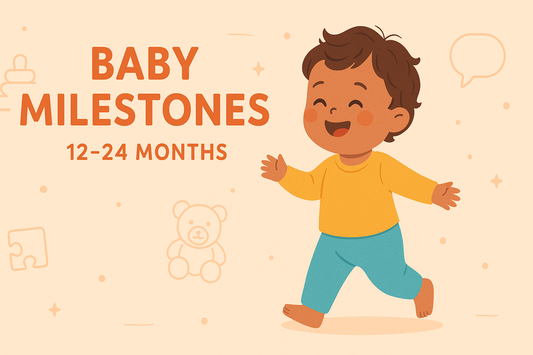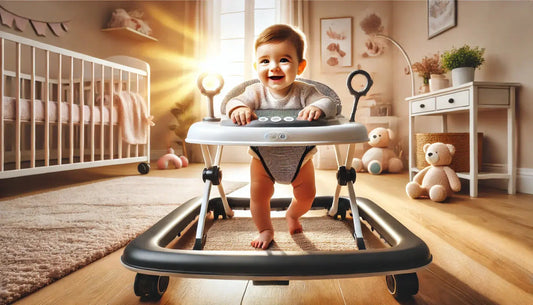
Your Baby's First Steps: Encouragement and Safety Tips
Share
Your baby’s first steps are one of the most exciting milestones in their early development. While most babies take their initial steps around 12 months, it’s important to remember that every child grows at their own pace. Whether your little one is showing signs of readiness or needs a bit of encouragement, these tips can help guide them on the path to walking.
1. Create a Baby-Friendly Environment
Ensure your home is conducive to walking practice. Remove slippery rugs, keep floors clean but not overly polished, and let your baby go barefoot or wear anti-slip socks for better grip. Place sturdy objects like a laundry basket or low stool that your baby can use for support as they pull themselves up to stand. Adding their favorite toy on top can motivate them to reach for it.
2. Provide Incentives
Encourage your baby to walk by holding out their favorite toy or snack a short distance away. Combine this with a big smile and plenty of enthusiasm to make the experience exciting. Your baby will love the attention and praise they receive when they take those first steps toward you.
3. Encourage Independence
It’s tempting to carry your baby everywhere, but giving them opportunities to move independently is essential. Put them down more often and allow extra time for them to crawl, pull up, and practice standing or cruising. This helps build confidence and strengthens their muscles.
4. Use Push Toys
Push toys, like a child-sized shopping cart or a walker wagon, can provide stability as your baby learns to walk. Unlike traditional baby walkers, push toys encourage natural walking movements and help improve balance and coordination.
5. Make Walking Fun
Turn walking into a game by using fun tools like squeaky shoes. Babies are naturally curious, and the playful sound of squeaky shoes can motivate them to take more steps. Look for options with removable squeakers to avoid noise overload.
6. Hold Their Hands
Hold your baby’s hands while they practice walking. This gives them the support they need while allowing them to develop their balance. As they gain confidence, gradually reduce the amount of support you provide.
7. Social Interaction
Spending time around other toddlers can inspire your baby to imitate their peers. Visit playgrounds, libraries, or playgroups where your child can observe and interact with other children who are already walking. Sometimes, seeing another child take steps can be the motivation they need.
8. Encourage Active Play
Activities like swimming and water play can help strengthen your baby’s leg muscles and improve their coordination. The resistance of water provides a low-impact way for them to build strength while having fun. Additionally, dance sessions at home or baby dance classes can boost their balance and confidence.
9. Engage With Pets
If you have a pet, your baby might find chasing or interacting with them to be an exciting activity. Pets can encourage your baby to crawl, stand, and eventually walk as they try to keep up with their furry friend.
10. Celebrate Every Step
Celebrate even the smallest milestones. Clap, cheer, and give plenty of hugs and kisses when your baby makes progress. Positive reinforcement helps build their confidence and encourages them to keep trying.
Safety Tips for First Steps
Every Baby Is Unique
It’s essential to remember that every baby develops at their own pace. If your baby hasn’t started walking by 18 months or if you have concerns about their development, consult a medical professional. They can provide guidance and recommend exercises tailored to your baby’s needs.
Above all, enjoy this incredible stage in your child’s life. Watching your baby take their first steps is a moment to treasure, so embrace the journey and celebrate every little achievement along the way.



